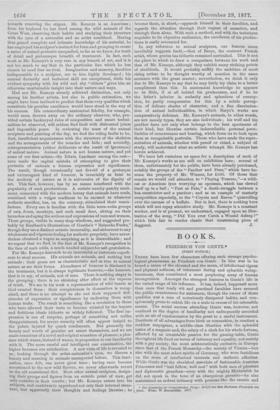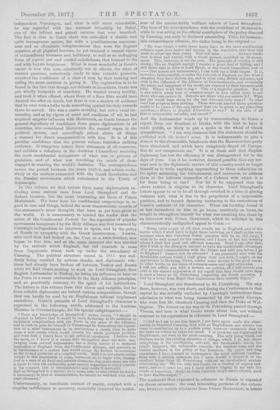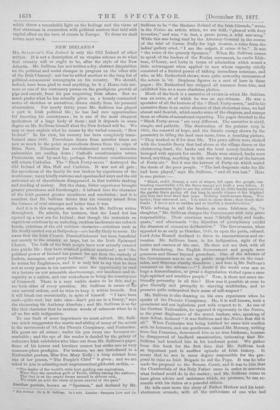BOOKS.
FRIEDRICH VON GENTZ.*
[MST NOTIOE.1
THERE have been few characters offering such strange psycho- logical phenomena as Friedrich von Gentz. In him was to be found a union of the elevated and the mean, of intellectual vigour and physical softness, of vehement daring and sybaritic volup- tuousness, that constituted a most perplexing array of human incongruities. Amongst the strangest features in Gentz's life is the varied range of his influence. It has, indeed, happened more than once that ready wit and practised faculties have secured the public countenance for statesmen, though the owner of these qualities was a man of notoriously dissipated habits, and con- spicuously prone to rakish life on a scale in excess of his ostensible means. The social success attending Gentz was, however, not confined to the degree of familiarity not unfrequently accorded with an air of condescension by the great to a useful instrument. Destitute of all advantages from birth or connection, in conduct a reckless scapegrace, a middle-class libertine with the splendid tastes of a magnate and, the salary of a clerk for his whole fortune, affected by an irresistable passion for the gaming-table, Gentz throughout life lived on terms of intimacy and equality, not merely with a gay society, the most aristocratically exclusive in Europe since that of the French Monarchy—the society of Vienna—but also with the most select spirits of Germany, who were fastidious on the score of intellectual interests and esthetic affinities. While Gentz was the cherished associate of fashionable Austrian Princesses and "hail fellow, well met" with both men of pleasure and diplomatic grandees—even with the mighty Metternich he did not speak in the tone of an obsequious parasite—he also maintained an ardent intimacy with persons like the caustic and * Zur Gescidelde der Orientalischen Frage r Briele sus dem Iraclamo lliedrichs von Gents. Wien: W. Braumtiller. 1877.
independent Varnhagen, and what is still more remarkable, he was regarded with the warmest friendship by Rahel, one of the loftiest and purest natures that ever breathed. The fact is that in Gentz there was embodied a double and quite incongruous nature, for with a pusillanimous sensuous- ness and an effeminate voluptuousness that were the flagrant negation of all physical heroism, ho yet retained a mental vigour of extraordinary keenness and brilliancy, as well as an unflagging force of joyous jest and cordial-mindedness, that beamed to the end with boyish brightness. What is most wonderful in Gentz's career is how this man, admittedly out at elbows, the slave of sensual passions, notoriously ready to take valuable presents, acquired the confidence of a class of men by their training and calling the most cautious in giving it. The explanation is to be found in the fact that though not delicate in his actions, Gentz was yet wholly incapable of treachery. He wanted money terribly, and took it when offered, where those of a finer fibre would have deemed the offer an insult, but there is not a shadow of evidence that he ever took a bribe to do something against his duty towards those he served. His was a coarse morality, but not a venal im- morality, and as by vigour of mind and readiness of wit he had acquired singular influence with Metternich, so Gentz became the general depositary of confidence from grave diplomatists in all countries, who considered Metternich the central organ in the political system, and accordingly prized above all things a channel for direct communication with him. It is of this peculiar confidence that the present volume furnishes striking evidence. It comprises letters from statesmen of all countries, and exhibits a subaltern in the Austrian Chancellery receiving the most confidential intimations of what was in process of gestation, and of what was troubling the minds of those engaged in weaving the world's destinies. The correspondence covers the period between the years 1823-9, and relates exclu- sively to the matters connected with the Greek Revolution and the Russian movements which culminated in the Treaty of Adrianople.
In this volume we find letters from many diplomatists, in- cluding some curious ones from Lord Strangford and Sir Robert Gordon, but the most interesting are those of Prince Metternich. We have here his confidential outpourings in re- gard to men and things, indeed the most characteristic records of this statesman's inner thoughts that have as yet been given to the world, It is unnecessary to remind the reader that the union of the Continental Powers for the repression of popular movements inaugurated by the Holy Alliance was first loosened by Canning's indisposition to intervene in Spain, and by the policy of Russia in sympathy with the Greek insurrection. Austria, who until then had looked on the Czar as a twin-brother, now began to fear him, and at the same moment she was startled by the attitude which England, her old comrade in arms from Napoleonic times, took up under the ascendancy of Canning. The political structure reared in 1815 was sud- denly being assailed by serious shocks, and diplomatic rela- tions had already been broken off between Turkey and Russia when we 'find Gentz seeking to work on Lord Strangford, then English Ambassador in Turkey, to bring his influence to bear on the Porte in a sense conformable to the Holy Alliance principles, and so practically contrary to the spirit of his instructions. The letters in this volume from this clever and versatile, but far from reliable diplomatist are indeed curious compositions, though they can hardly be read by an Englishman without unpleasant sensations. Gentz's estimate of Lord Strangford's character is expressed in the following words, addressed to the Austrian Minister in Constantinople, for his special enlightenment :- "Prom my knowledge of Strangford," writes Gont4, "I should be disposed to believe that it would be more flattering to his ambition to terminate complications with the Porto iu the Noose of the and to seek to gain for himsoff in Vienna and St. Petersburg tho reputa- tion of a chief instrument in so meritorious a result, than to enter upon a new career which would reverse his whole previous position, and even deal a heavy blow to his political reputation. I believe this the more, as I know of a surety that Strangford does not wish, nay, judging from several expressions, has a lively horror of a declared separation of England from the Continental alliance, and specially so in furtherance of a system that would stamp the British Government as the formal protector of a criminal revolt. Still I do not attach undue weight to this impression of mine, inasmuch as, to begin with, Strang- ford is a man of no fixed and reliable character, but much more one who is liable to tern his undeniably groat mental capacities to every quarter
of the compass, just as circumstances may make it desirable And as Strangford is a master, as in many arts, so also (when he thinks it necessary) in that of dissimulation, he cannot bo watched with suffi- cient closeness."
Unfortunately, an inordinate amount of vanity, coupled with a singular indifference to accuracy, materially impaired the useful-
ness of the unmistakably brilliant talents of Lord Strangford. The tone of his correspondence with the confidant of Metternich, while he was acting as the official mouthpiece of the policy directed by Canning, can only be declared astounding. Take, for instance, this extraordinary effusion, the italics being in the original :—
" My dear friend, I write these hasty lines in the most confidential reliance upon your honour and secrecy, in the conviction that they will meet no other eye than yours. You will infer that my credit hero is dead and buried, with a Greek epitaph inscribed on its monu- ment. This, however, is not the case. The principle of vitality is still strong; like an English mastiff, I require a groat deal of killing, and I still think that in spite of Lord Byron, of the Greek Committee, and of (but names are unnecessary), I can hold out a little longer. It is, however, indispensable, to make the Liberals of England see into what a situation they have thrown me, and to what risks British influence, and with it the influence of the Alliance at Constantinople, and eventually the peace and happiness of the world, are exposed by their inconceivable folly. Where is all this to slop? This is a frightful question. But it is one which every man of common-sense is now called upon to ask those who can answer it. But who are those who can answer it ? What has the world been doing for the last five-and-forty years? In what road has progress been making. Those who can answer those questions ought to ho aware of the only answer that can he given to my preceding question,— Where is English Liberalism to stop? In the ruin of all that is respectable, valuahlo, and sacred l"
And the Ambassador winds up by communicating to Gentz a report from our Resident at Ithaka, with the hint to have it made public, as likely to put a spoke in the wheel of Greek
sympathisers. " I am very desirous that this statement should be published with the writer's name. It is indispensable to give a dthnenti to the abominable falsehoods that the Mavrocordato party have circulated, and which have completely duped all Europe. But do not compromise me." It is at times said that English diplomacy has lost the efficiency it was distinguished for in the days of yore. Can it be, however, deemed possible that any ser-
vant now in the diplomatic service of this country could so forget himself as to write anything approaching to these reflections on the spirit animating his Government, and moreover, to address them to the intimate counsellor of a Cabinet with which it is far from being at one ? Nor let it be supposed that the above extract is singular in its character. Lord Strangford's letters appear to us to be all through couched in a tone at glaring variance with what is due to the proprieties of a responsible position, and to furnish damning testimony to the correctness of Gentz's estimate of his character. When his lordship found it
at last incumbent on him to go home, nominally on leave, he sought to strengthen himself for what was awaiting him there by
an interview with Prince Metternich, which he solicited in this characteristically undignified appeal to Gentz :—
" Being quite aware of all that awaits me in England, and of the battles which I shall have to fight there (arriving, as I shall, at the very moment when this diabolical Greek question will be in lull fury), I wish to be well armed for the combat, and I know of but one armoury whore I shall find good and efficient weapons. Wood I say, after this, that I wish in the strongest manner to have the incalculable advantage of a personal communication with the Prince and with you before I go to England? Cannot this be effected ? I am persuaded that with the invaluable notions which I shall glean from you both, I might, on my appearance in Downing Street, render some service to the good cause; in other words, to the cause of common-sense and right principles. . . . I will not afflict you with a lecture on polities, all I will trouble you with is the sincere expression of my regret that they should have been in such a hurry at St. Petersburg respecting the Greek question. I find by a letter from Begot that conferences have actually begun."
Lord Strangford was transferred to St. Petersburg. His stay there, however, was very short, and during the Conferences in that capital he was actually excluded by Canning's instructions from admission to what was being transacted by the special Envoys, who were first Mr. Stratford Canning and then the Duke of Wel- lington. The former on his way to St. Petersburg passed through Vienna, and here is what Gentz wrote about him, not without contrast to his expressions in reference to Lord Strangford " Glad as I am to see him depart, I yet have again made the obser- vation in Stratford Canning, that with an Englishman one always can come to conclusions up to a certain point, however erroneous may bo the basis on which ho takes his stand. I at least am not frightened at Englishmen, not even at the most cunning. The only thing which can frighten me in the existing situation of things, which I do fear above everything, is tho overbearing self-will, the incalculable starts, the febrile humours, the unbearable conceits, the insolent tone, and the hidden shallows in the policy of the Russians. By yours and long experience I have learned to contemplate the worst political combina- tions with a certain calmness, but I open hardly a despatch or the smallest letter from St. Petersburg without an involuntary anxiety overcoming me. We are, with this Court, on a footing of sugary inti- macy, and so it must be •, yet I have always ringing in my ears the words of Lucretius, ' Medio do fonto loporum surgit maul aliquid, (pod in ipsis floribus angst.' "
The sentiment thus expressed in reference to Russia is repeated on divers occasions ; the most interesting portions of the volume are, however, certain utterances from Prince Metternich, in letters which throw a remarkable light on the feelings and the views of that statesman in connection with political matters that told with capital effect on the turn of events in Europe. To these we shall return next week.








































 Previous page
Previous page